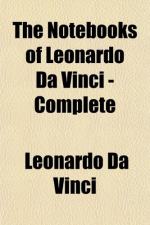The image of the sun where it falls appears as a thing which covers the person who attempts to cover it.
(Money and Gold.)
Out of cavernous pits a thing shall come forth which will make all the nations of the world toil and sweat with the greatest torments, anxiety and labour, that they may gain its aid.
(Of the Dread of Poverty.)
The malicious and terrible [monster] will cause so much terror of itself in men that they will rush together, with a rapid motion, like madmen, thinking they are escaping her boundless force.
(Of Advice.)
The man who may be most necessary to him who needs him, will be repaid with ingratitude, that is greatly contemned.
1329.
(Of Bees.)
They live together in communities, they are destroyed that we may take the honey from them. Many and very great nations will be destroyed in their own dwellings.
1330.
WHY DOGS TAKE PLEASURE IN SMELLING AT EACH OTHER.
This animal has a horror of the poor, because they eat poor food, and it loves the rich, because they have good living and especially meat. And the excrement of animals always retains some virtue of its origin as is shown by the faeces ...
Now dogs have so keen a smell, that they can discern by their nose the virtue remaining in these faeces, and if they find them in the streets, smell them and if they smell in them the virtue of meat or of other things, they take them, and if not, they leave them: And to return to the question, I say that if by means of this smell they know that dog to be well fed, they respect him, because they judge that he has a powerful and rich master; and if they discover no such smell with the virtue of meet, they judge that dog to be of small account and to have a poor and humble master, and therefore they bite that dog as they would his master.
1331.
The circular plans of carrying earth are very useful, inasmuch as men never stop in their work; and it is done in many ways. By one of these ways men carry the earth on their shoulders, by another in chests and others on wheelbarrows. The man who carries it on his shoulders first fills the tub on the ground, and he loses time in hoisting it on to his shoulders. He with the chests loses no time. [Footnote: The subject of this text has apparently no connection with the other texts of this section.]
Irony (1332).
1332.
If Petrarch was so fond of bay, it was because it is of a good taste in sausages and with tunny; I cannot put any value on their foolery. [Footnote: Conte Porro has published these lines in the Archivio Stor. Lombarda VIII, IV; he reads the concluding line thus: I no posso di loro gia (sic) co’ far tesauro.—This is known to be by a contemporary poet, as Senatore Morelli informs me.]
Tricks (1333-1335).
1333.




